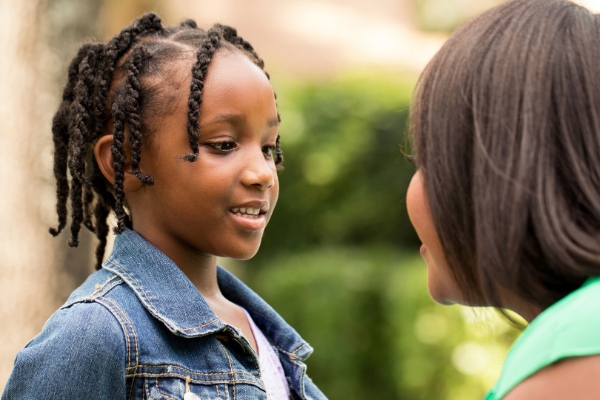By Clifford Richmond, LMFT, Outpatient Supervisor
The children in our lives are always learning. They pick up many different messages, whether we want them to or not! Depending on the age of your child, and their ability to access the information of the world, they are receiving a wealth of knowledge from teachers, friends, social media, the news, grandparents, you, billboards, commercials, and so much more. The influx of conflicting information can be overwhelming and confusing, especially for children who are concrete thinkers. They are still developing their own opinions and conceptualizations of the world and society, and the very nature of their developmental stage can make them want to sort things into clearly defined boxes: up-down, in-out, over-under, yes-no. If you find yourself wondering how you can talk with them in the coming days and weeks about politics, let’s review some quick thoughts:
- Talk about it, don’t avoid it: Your children are definitely hearing and thinking about the election and politics. As their caregiver, they love you the most in this world and your voice matters. Plan an honest conversation about why elections are important and what this elections means. Provide them with opportunities to ask questions so you can better understand how they are interpreting the different messages they are hearing around them.
- Keep the tone neutral: Children are smart and emotionally tuned in, especially to their caregivers. When you approach a topic with anger, intensity, or anxiety, they will pick up on it and can internalize these experiences in ways you do not intend. Focus on answering questions and sharing your thoughts in a calm manner. Share what you think and if you don’t have the answer, you can be open about that. “I’m not sure why people think that. What do you think?” Help your child understand that while humans are different, we are all connected. Younger children in particular will benefit from understanding that we have more in common than we have differences.
- Have a plan on how to respond to your child if you and your parent/co-caregiver have differing views: It’s important for children to learn to listen to opposing sides and try to navigate differing viewpoints. Make sure you’ve talked to your partner/co-caregiver about how you want to send differing messages to your children, and why those view points are important. Remind them that part of growing up is coming to their own conclusions and beliefs, and that you’ll support them and love them no matter what. When they see the two of you disagreeing in a civil and constructive manner, that sends an important message about love and acceptance.
- Listen to their thoughts and opinions: Your children and adolescents have opinions of their own, and its healthy to foster that creative thinking and questioning! Create space for them to share their thoughts and inquiries with you – and answer neutrally and calmly. Your children may surprise you with what they think or believe. They might be exploring opinions and values that differ from yours, especially if their friends believe these things. But remember, parents truly are the number one influence on children’s attitudes and behaviors (even if they say otherwise), so allow them space to explore the world and encourage them to ask questions. You can share your beliefs and your family values, and offer them the space to weigh your values against those of their friends. Odds are, as they grow and learn, their opinions will shift and change too. This is a good thing.
- Focus on what is in your control and help them choose action that aligns with their values: Whether your candidate wins or not, focusing on what is within their control and taking action to support your principles is empowering. Particularly if your child is experiencing sadness or uncertainty, creating a list of things they can do to be part of the world they desire can help channel stress and anxiety into positive movement. You’re never too young to figure out how you want to give back to the world. Have your child make a list of things they care about, and find ways to volunteer, do a project, read a book, or explore a website about that topic. You’re teaching life-long skills of political engagement, emotional resilience, and perseverance, whatever the topic.
- Practice empathy: Empathy is a vital tool, particularly when dealing with difference and unrest. It is human nature when emotionally charged to settle into an us vs. them mentality. However, practicing empathy is a powerful tool against hate and can allow our children to grow into thoughtful, caring people. We can be empathetic towards those we disagree with and still advocate for our beliefs and rights. Empathy protects us from experiencing anger, hate, fear, or hostility, and makes coexisting with differences much easier. We want our children to be loving, emotionally connected, empowered people. Practicing empathy is a great way to do this.
In the end, navigating political news with our children is an opportunity to strengthen our relationships. Listen with open ears, connect with your co-parent or caregiver to decide on an approach, and help your children make a plan for action if they need one. Talking about the state of our world is an important thing, and can help your children learn that you are a trusted source of information and support when things feel unknown or overwhelming. A sense of safety and stability comes from our family systems and this can support and propel children to bravely and confidently move forward in the world.
About the author: Clifford Richmond is a Licensed Marriage and Family Therapist who believes in the power and strength of the family system. With a background in Eco-Systemic Structural Family Therapy, Cliff works to assess and observe all aspects of the family system to ensure that the family home is place where children and parents can reach their full potential. With a Masters Degree in Marriage and Family Therapy from LaSalle University, he has worked in many different therapeutic settings, including Outpatient, Community-Based, and Inpatient Hospital environments. He has completed the ESFT Family Based 3-Year Clinical training, is trained in Trauma Focused Cognitive Behavioral Therapy, and is an AAMFT Approved Supervisor.

